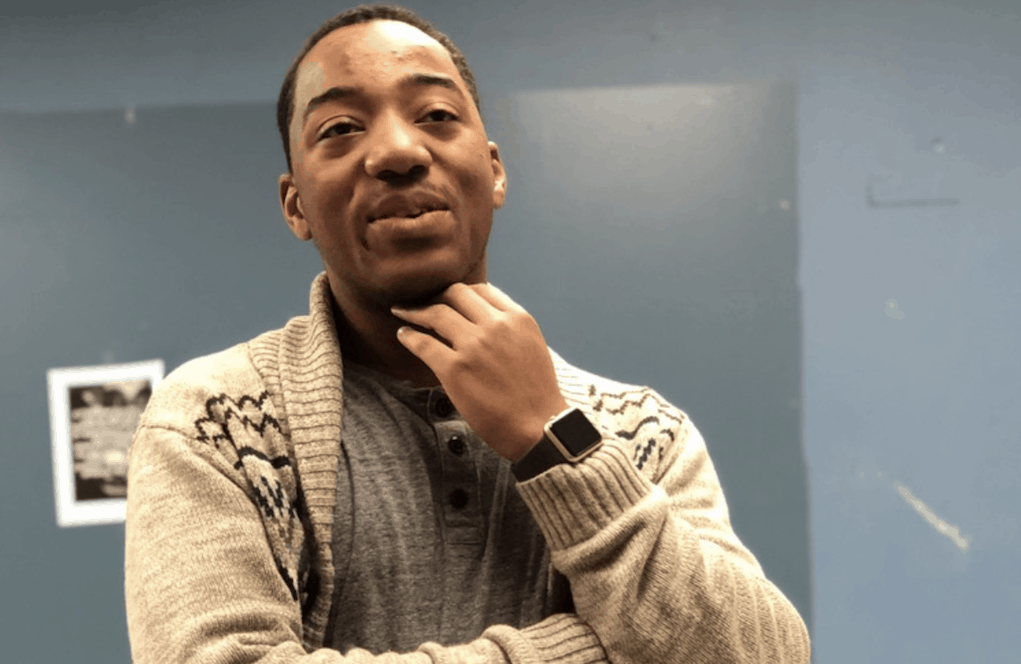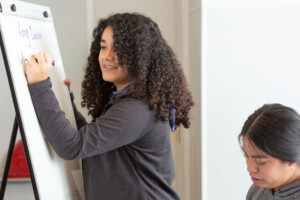How to Develop Poised, Thoughtful, Articulate Teenagers

Horace (above) is a poised, thoughtful, articulate high school junior. He’s also a Youth Commissioner for the city of Philadelphia, president of a nonprofit organization, and vocal advocate for his school, the Science Leadership Academy (SLA) where he has “Taken on the role of school dad.”
Wes (below) is the Youth Poet Laureate of Philadelphia and is working with YouthBuild Philly. He transferred from to SLA from a traditional school in Detroit. “There is more checking into my values and ideals here,” said Wes.

With an enrollment of 500, people often wonder how SLA students are represented everywhere in the city. The student leadership apparent across Philadelphia is “because of what is taught at SLA,” said Chris Lehmann, founding principal of SLA, “We want kids to understand that what we do now matters. Right now. Today.”
Launched in 2006 by Lehmann, SLA operates two other schools (including SLA Middle and SLA at Beeber).
Consistently Strong Inquiry-Based Learning
Every classroom at SLA exhibits the five core values of inquiry, research, collaboration, presentation, and reflection. Visit classrooms and you’ll see students working in teams, creating, analyzing, and presenting. The remarkable consistency of powerful learning across the curriculum is evidence of deep teacher collaboration.
Ninth graders study question about identity. Tenth graders study systems. Eleven graders study change. Seniors conduct a yearlong engineering project.
“We want to develop young people that are thoughtful, wise, passionate, and kind,” said Lehmann.
SLA teachers use a common process to plan lessons that Lehmann said is built from a strong commitment to shared practices. As a result, “Kids get it quickly and spend less time figuring out the game of school,” said Lehmann.
All 9th and 10th grade classes have a Student Assistant Teacher, an upperclassman that answers questions and provides small group instruction. “It creates smaller groups and improves classroom management,” said Lehmann. For the student teachers, it provides a leadership experience
SLA is 1:1 with Dell Chromebooks and uses the Canvas learning platform. While the technology is ubiquitous, it doesn’t get in the way of classroom dialog. Most classrooms have a productive buzz of collaborative groups or students presenting their work.
Lehmann’s son Jakob, a freshman, said, “SLA is different than middle school where it was cramming stuff in your head, this school is based on questions not answers.”
Advisory and Culture
Key to college and career readiness is the SLA advisory system. Students meet with advisors in groups of about 20 every day for all four years.
On how they develop such mature young people, Lehmann said, “We create space for human interaction. We create conditions where people want to be their best selves. People rise to the occasion.”
Discipline at SLA is restorative. “We are more than our bad decisions,” said Lehmann. “We help kids own what they did and stay in community.”
SLA helps students reflect on and share their growth with narrative report cards and portfolios of personal bests.
Each advisory group has a student that acts as a College Access Leader. They work with counselors to access college and career information for their cohort. When an SLA advisor writes a recommendation for a student, it is based on four years of dialog and a community of care.
At homecoming, SLA graduates run panels on college and career readiness.
Philadelphia Innovation Network
The 10 progressive semi-autonomous schools in the School District of Philadelphia work together in a network with the support of Assistant Superintendent Christina Grant and a grant from ECMC.
SLA is the oldest and most academically mature school in the network and is also the only magnet school. While they do look at grades, they also spend a lot of time screening for interest in their interviews with possible new students.
While other schools in the network have focused on outcomes and assessments, SLA makes learner experience a priority. It is the best example of consistently high quality inquiry-based learning we’ve seen. The best evidence is a conversation with SLA seniors and graduates.
If Ted Sizer had the opportunity to meet Horace from SLA, he would be hopeful.
For more see:








Ron
Thank you for sharing this profile of the Science Leadership Academy. It sounds like an ideal system that has been honed to the right core values. The incredible outcome of mature, educated citizens is the natural consequence of inquiry based education. Great article, Tom.